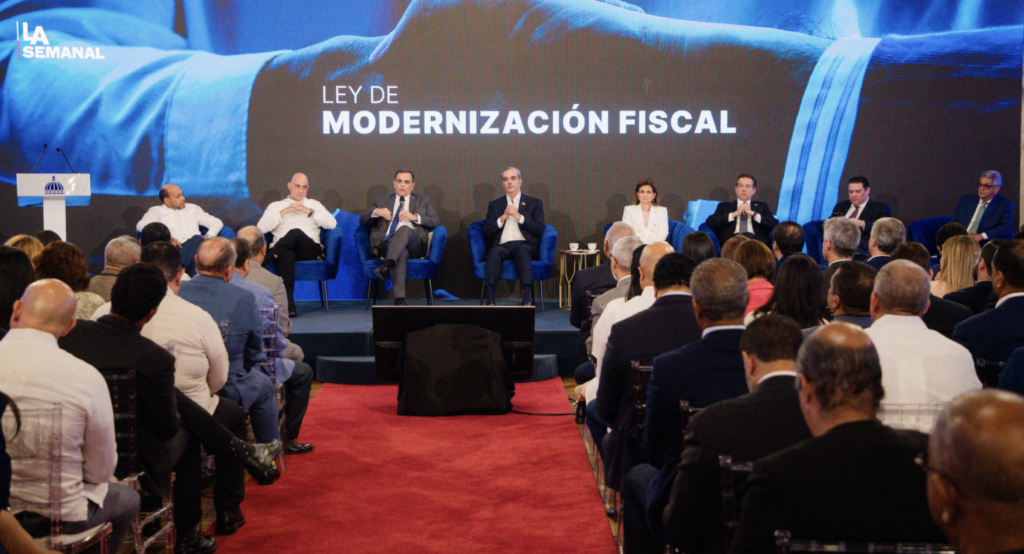
The Presidency has placed its cards on the table regarding fiscal changes. This is the second tax proposal made by President Luis Abinader. A first in his previous term was rejected by public uproar.
During the La Semanal press conference on 7 October 2024, President Luis Abinader and Hacienda Minister Jose Manuel (Jochi) Vicente outlined the proposed Tax Modernization Law aimed at securing an additional RD$122 billion in funding for social spending, security transportation and other infrastructure projects. The first term of the Abinader government significantly increased current spending, mostly expenditures for staff, in detriment to capital spending.
The Abinader administration presented a National Budget for 2025 with RD$1.3 trillion in current spending, RD$298 billion for interest payments and RD$188 billion for capital spending.
The Abinader administration has yet to submit the bill for the tax amendments to the National Congress. The ruling Modern Revolutionary Party (PRM) has the needed majority in Congress to pass the fiscal amendments.
During the press conference, President Luis Abinader and Hacienda Minister Jose Manuel (Jochi) Vicente outlined the basic elements of their tax initiative, which they described as one that seeks to ensure greater tax equity, modernize the tax system, and enhance tax compliance. Vicente did not give details on efforts to combat tax evasion.
Hacienda Minister Vicente emphasized that the reforms aim to create a level playing field for businesses, eliminate existing distortions and privileges, and ensure fair contributions from all taxpayers.
As part of the modernization, the government proposes to change the name of the ITBIS tax to the more international Value Added Tax (VAT).
Among the key provisions proposed:
The VAT would apply to digital purchases.
Elimination of advance payments for individuals and microenterprises, with advance payments reduced to 40% for small and 60% for medium-sized enterprises.
Annual adjustments to the tax-free income threshold to account for inflation.
A single 18% rate for the ITBIS tax, the local Value Added Tax (VAT), exempting essential items like bread, rice, chicken, eggs, milk, plantains, and yucca.
Duly accredited education and healthcare businesses, electricity, water, waste collection, passenger transportation, residential rent, pensions, and financial services will continue to be exempt from the ITBIS tax.
The government announced it has earmarked RD$52.17 billion over the next four years for public safety, including hiring 20,000 new police officers and acquiring advanced technology. Additionally, funds will be allocated for infrastructure projects, such as the third cable car line, a Santo Domingo-San Cristóbal train, a metropolitan train for Santo Domingo, and a tram.
The proposed law will also finance a primary care strategy benefiting 5.8 million people enrolled in the Subsidized Health Plan. Moreover, local governments will receive increased funding to improve services such as waste collection and emergency response.
The Central Bank will receive capital to support a stronger economic environment, and investments in the electricity sector will reduce distribution losses and ensure reliable power supply.
The presumptive income or earnings for Dominican companies obtained by foreign transportation and insurance firms will increase from 10% to 15%.
The withholding tax on fees, commissions, and other remuneration for services provided by individuals will also rise from 10% to 15% as an advance payment.
The maximum withholding tax on prizes or winnings from games of chance will increase from 25% to 27%.
Incentives for the tourism sector outlined in paragraphs II, III, and IV of Article 1; Article 2; the sole paragraph of Article 3; and Articles 4, 5, 6, 7, and 14 of Law No. 158-01 for the Promotion of Tourism Development and its amendments (Confotur) will be eliminated.
Tax exemptions for the textile industry specified in Articles 2 and 4 of Law 56-07 will also be removed.
Article 50 of Law 392-07 on Competitiveness and Innovation (Proindustria), which provided incentives for industries, will be repealed.
The exemption from Income and Dividend Tax established by the Trust and Real Estate Development Law will be revoked to align the treatment of trusts with that of legal entities; however, the ITBIS bond and tax treatment for Succession and Guarantee Trusts will be maintained.
Incentives outlined in Law 108-10 for the Promotion of the Film Industry will be eliminated.
Incentives specified in Law 340-19 for Cultural Patronage will also be removed. The ruling for the law had just been issued.
Articles 1, 2, 4, and 5 of Law 12-21 for Border Development will be amended to establish minimum investment and employment amounts required to access the incentives under that law, along with compliance with the investment program as a requirement to continue operating under the incentive regime.
The income tax on sales to the local market by Free Zone companies will increase from 3.5% to 5%.
An option will be established for filing a sworn declaration under the ordinary regime based on the proportion of local sales.
Income tax will be applied to activities offered by free zone park operators.
A specific tax per alcohol proof grade will be RD$840, with ad valorem tax applicable to alcoholic beverages increased to 11%.
A tax would be imposed on non-alcoholic beverages based on sugar content: 5.01 gr to 10gr sugar RD$0.58 per 100 ml and those with more than 10.01gr RD$1 per 100 ml.
Driver circulation tax per vehicle will be RD$3,000 for vehicles five years and older and RD$6,000 for those less than five years.
Real estate taxes (Impuesto al Patrimonio Inmobiliaria – IPI) with the exemption now being RD$5,025,380.75 and 1% on the difference.
Read more in Spanish:
Presidency
Presidency
Hacienda
Listin Diario
Listin Diario
Listin Diario
El Dia
El Dia
El Caribe
El Caribe
Diario Libre
Diario Libre
Diario Libre
Diario Libre
Diario Libre
Esta Noche con Mariasela
8 October 2024

